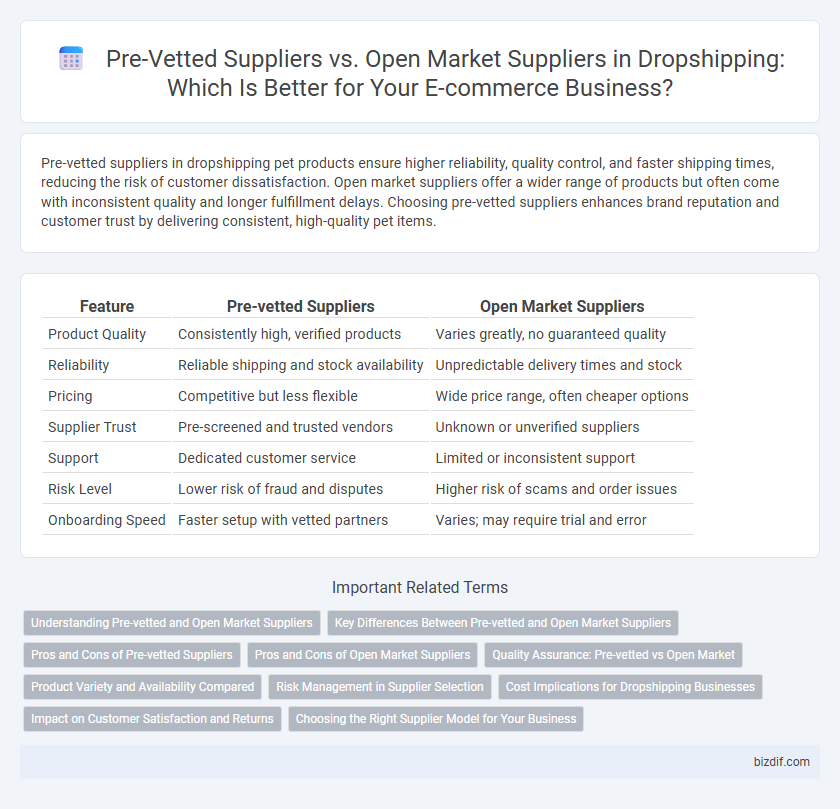Pre-vetted suppliers in dropshipping pet products ensure higher reliability, quality control, and faster shipping times, reducing the risk of customer dissatisfaction. Open market suppliers offer a wider range of products but often come with inconsistent quality and longer fulfillment delays. Choosing pre-vetted suppliers enhances brand reputation and customer trust by delivering consistent, high-quality pet items.
Table of Comparison
| Feature | Pre-vetted Suppliers | Open Market Suppliers |
|---|---|---|
| Product Quality | Consistently high, verified products | Varies greatly, no guaranteed quality |
| Reliability | Reliable shipping and stock availability | Unpredictable delivery times and stock |
| Pricing | Competitive but less flexible | Wide price range, often cheaper options |
| Supplier Trust | Pre-screened and trusted vendors | Unknown or unverified suppliers |
| Support | Dedicated customer service | Limited or inconsistent support |
| Risk Level | Lower risk of fraud and disputes | Higher risk of scams and order issues |
| Onboarding Speed | Faster setup with vetted partners | Varies; may require trial and error |
Understanding Pre-vetted and Open Market Suppliers
Pre-vetted suppliers in dropshipping undergo thorough screening for product quality, reliability, and shipping times, ensuring consistent customer satisfaction and reduced risk of fraud. Open market suppliers offer a broader range of products but require careful vetting by the retailer to avoid issues such as counterfeit goods or delayed deliveries. Choosing pre-vetted suppliers streamlines operations and enhances trust, while open market suppliers allow for greater product diversity at the cost of increased due diligence.
Key Differences Between Pre-vetted and Open Market Suppliers
Pre-vetted suppliers undergo thorough background checks to ensure product quality, reliability, and adherence to shipping timelines, reducing the risk of fraud and counterfeit goods. Open market suppliers offer a broader selection but often lack verified performance metrics, which can result in inconsistent product quality and shipping delays. Choosing pre-vetted suppliers improves trust and customer satisfaction, while open market suppliers provide flexibility and a wider range of product options.
Pros and Cons of Pre-vetted Suppliers
Pre-vetted suppliers in dropshipping offer reliability by ensuring product quality and timely order fulfillment, minimizing risks of counterfeit items or shipment delays. Their established credibility accelerates trust-building with customers but usually comes with higher product costs compared to open market suppliers. Dependence on pre-vetted suppliers may limit product variety and flexibility, potentially reducing opportunities for niche market exploration.
Pros and Cons of Open Market Suppliers
Open market suppliers offer a wide variety of products and competitive pricing but often lack thorough vetting, which increases risks related to product quality and reliability. The absence of pre-vetting can lead to inconsistent shipping times and potential issues with supplier communication, impacting customer satisfaction. However, their accessibility and extensive inventory make them an attractive option for dropshippers seeking flexibility and diverse product offerings.
Quality Assurance: Pre-vetted vs Open Market
Pre-vetted suppliers undergo rigorous quality checks, ensuring consistent product standards and reducing the risk of defects or counterfeit goods in dropshipping. In contrast, open market suppliers often lack stringent vetting processes, increasing variability in product quality and potential customer dissatisfaction. Choosing pre-vetted suppliers enhances reliability and trust, directly impacting customer retention and brand reputation.
Product Variety and Availability Compared
Pre-vetted suppliers typically offer a curated selection of high-quality products with consistent availability, reducing the risk of stockouts and ensuring better supply chain reliability. In contrast, open market suppliers provide a broader product variety but often face inconsistent inventory levels, leading to potential delays and challenges in order fulfillment. Choosing pre-vetted suppliers enhances product consistency and delivery efficiency, crucial factors for dropshipping success.
Risk Management in Supplier Selection
Pre-vetted suppliers offer a significant advantage in dropshipping by minimizing risks related to product quality, shipping reliability, and fraud, ensuring a safer supply chain. Open market suppliers may provide wider product variety and competitive pricing but often require rigorous due diligence and ongoing monitoring to mitigate risks of inconsistent fulfillment and customer dissatisfaction. Effective risk management in supplier selection prioritizes verified credentials, reliability metrics, and transparent communication to safeguard brand reputation and customer trust.
Cost Implications for Dropshipping Businesses
Pre-vetted suppliers often offer competitive pricing due to established partnerships and bulk purchasing power, reducing overall costs for dropshipping businesses. Open market suppliers may seem cheaper initially but can result in higher expenses caused by inconsistent product quality, longer shipping times, and increased return rates. Choosing pre-vetted suppliers minimizes hidden costs, enhances reliability, and improves profit margins for dropshipping entrepreneurs.
Impact on Customer Satisfaction and Returns
Pre-vetted suppliers ensure higher product quality and reliable shipping times, significantly reducing return rates and boosting customer satisfaction in dropshipping. Open market suppliers often present inconsistent quality and fulfillment delays, leading to increased returns and negative reviews. Selecting pre-vetted suppliers streamlines the supply chain, improving overall buyer trust and repeat purchase rates.
Choosing the Right Supplier Model for Your Business
Selecting pre-vetted suppliers ensures consistent product quality, reliable shipping times, and reduced risk of fraudulent activities, which directly impacts customer satisfaction and brand reputation. Open market suppliers offer a wider product variety and often lower prices, but they require extensive vetting and quality control efforts to avoid inventory issues and delayed deliveries. Analyzing your business priorities, such as scalability, product niche, and risk tolerance, helps determine whether a stable pre-vetted model or a flexible open market approach aligns best with your dropshipping strategy.
Pre-vetted Suppliers vs Open Market Suppliers Infographic

 bizdif.com
bizdif.com